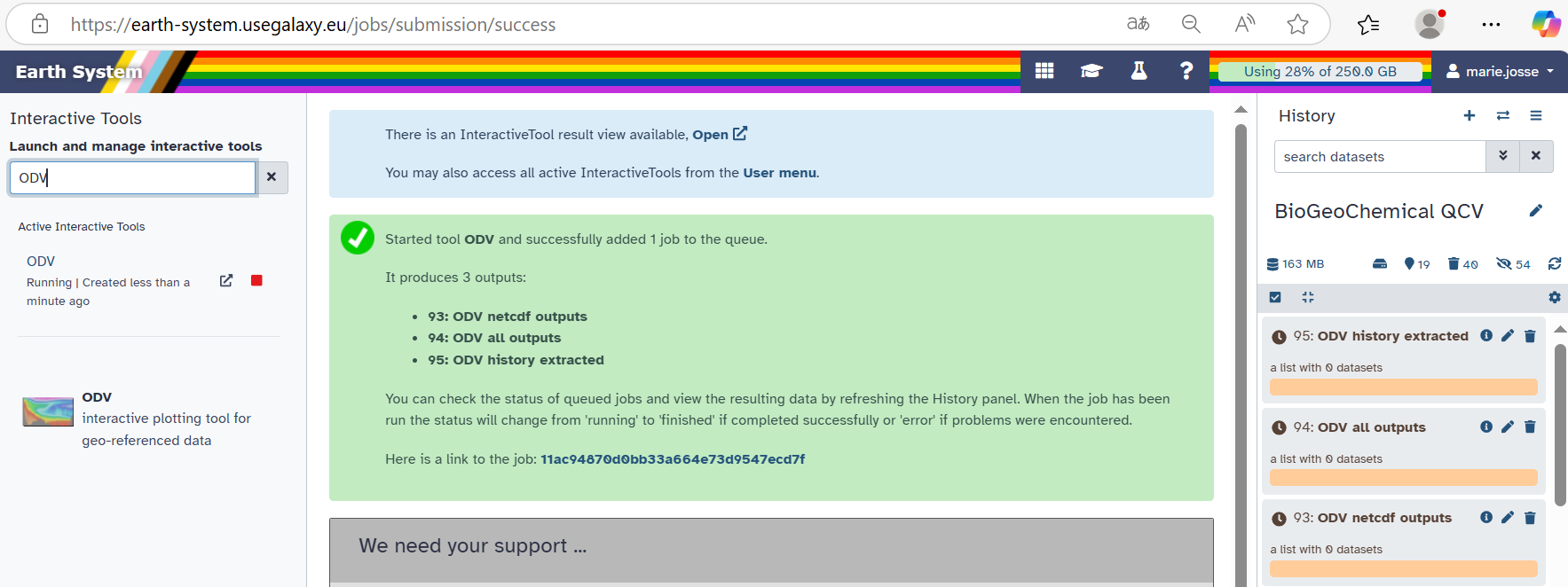The Galaxy Project is an open, web-based platform designed to make data-intensive research more accessible, reproducible, and collaborative. Originally developed for bioinformatics, Galaxy has been successfully extended by FAIR-EASE to support Earth System sciences and geospatial data processing.
Why Galaxy matters for FAIR-EASE¶
Galaxy is first and foremost a processing platform. Galaxy is built to scale, capable of executing processes on heterogeneous infrastructures, including HPC clusters and cloud systems. With Galaxy Pulsar, jobs can be delegated to remote compute nodes, improving performance and distribution.
At its core, Galaxy provides seamless access to a vast and diverse ToolShed (i.e. Appstore) comprising nearly 10,000 tools, ranging from format converters and statistical analysis tools to data visualization applications and interactive environments like JupyterLab, as well as desktop applications that run directly in the browser.
Galaxy supports a wide range of data access protocols (e.g. WebDAV, S3, FTP, and iRODS), enabling users to easily work with curated reference datasets or bring in their own data.
A key feature of Galaxy is its powerful workflow engine, which allows users to create, share, and reuse complex data analysis pipelines. Thanks to a comprehensive provenance tracking, Galaxy supports RO-Crate metadata export, ensuring full traceability of both data and processes.
Security plays a central role in the platform, with SSO interfacing (e.g. via OpenID Connect), and secret management to avoid having passwords in plain text.
Galaxy is also designed to integrate with key research infrastructures, offering direct connections to repositories such as Zenodo and WorkflowHub. Its dynamic Galaxy training network promotes continuous learning and skills development through collaborative tutorials, workshops and training materials.

Figure 1:Galaxy web UI
Key Contributions of FAIR-EASE to Galaxy¶
Within FAIR-EASE, Galaxy was enhanced in several ways to better support FAIR principles:
RO-Crate adding tool information : Id, name, version, description, toolshed’s url from tools used in an analysis are now added in RO-Crate archive ;
RO-Crate Validation Tool: a validator was developed to check RO-Crate compliance with declared profiles. It supports validation from local/remote sources, has CLI and Python API access, and accepts custom SHACL profiles ;
[OGC API:Processes Integration]: Initial work began to expose Galaxy workflows as OGC-compliant computational services. It consists of a [FastAPI] bridge server between [Galaxy’s] API and [Open Geospatial Consortium APIs] ;
ODV Format Support: Galaxy can now recognize and handle Ocean Data View (ODV) files, including an interactive tool for visualization ;
ZIP Explorer: lets users browse and selectively extract files from ZIP archives (local or remote), including RO-Crates, improving data ingestion and metadata recognition ;
Improved Interactive Tools Panel: provides better access and status tracking for user sessions.
These developments significantly improved Galaxy’s usability, interoperability, and alignment with FAIR data management principles, making it a core component of FAIR-EASE.

Figure 2:FAIR-EASE usage of Galaxy